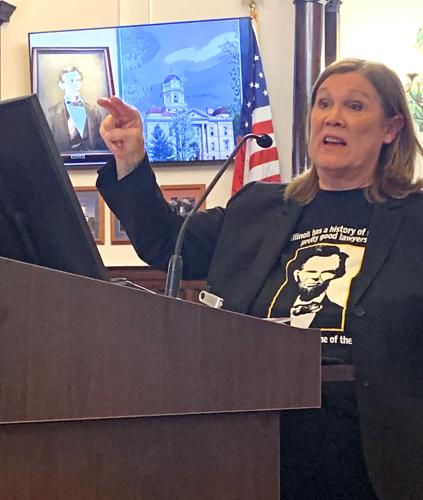CARTHAGE, Ill. – Everyone at the Hancock County Courthouse learned something new about Abraham Lincoln Saturday night, April 20. Even the speaker, Illinois Appellate Court Justice Debra Walker.
Walker, from Chicago, came to Carthage to talk about Abraham Lincoln and the footprints and legacy he left in Hancock County, presenting the quarterly program of the Hancock County Historical Society.
Walker led with the story of Lincoln defending William Fraim in the Hancock County Courthouse in 1839. Fraim was charged with murder. He was found guilty and hanged.
In the process, Walker, and others at the program, learned that an ancestor of Keith Bruns, chairman of the Hancock County Historical Society board, had been involved in building the scaffolding for that hanging.
“Well, that’s something I didn’t know,” she said, as she proceeded on with her story.
Walker reviewed Lincoln’s many visits to Hancock County over the years, and the “footprints” he left, part of her presentation: “From Courthouse to Campaigns: Lincoln’s Footprints in Hancock County and his Enduring Legacy.”
One footprint was how he conducted himself as an attorney.
In the Fraim case, the young Irish deck hand killed a man in a pub brawl in Schyler County. It took Lincoln two days to travel from his office in Springfield to Carthage, where the trial was moved on a change of venue. It was Lincoln’s second murder trial.
After Fraim’s sentencing, Lincoln didn’t stay for the execution, but hurried back to Springfield to work on his next case. Lincoln was an attorney in many cases in Illinois, and presented 175 cases to the Illinois Supreme Court. He argued one case before the U.S. Supreme Court.
Lincoln left many footprints throughout the state, during his campaigning for the Senate and later the Presidency. Lincoln’s key issue in the famous Lincoln-Douglas debates was keeping slavery from the new territories. There were seven debates around Illinois.
His speech on the courthouse lawn in 1858, (now marked with a large rock) was in part an explanation of a fee he received for services as defense attorney in a CB&Q Railroad case. Stephen Douglas insinuated that Lincoln of taking campaign money from the railroad.
“As we continue speaking about Lincoln’s footprints in Hancock County, we have to talk about his family that was here,” Walker noted. “That’s a pretty big footprint.”
Mordecai Lincoln was a brother of Abraham’s father. Mordecai and his sons came to settle in Hancock County. The day after his speech in Carthage, Abraham took the Macomb mail stage, getting off at Fountain Green to visit family.
Several family members are buried near there, including a cousin, also named Abraham Lincoln. Both were named for their grandfather, Abraham.
Lincoln’s “enduring legacy” for attorneys in Illinois was his determination to be honest and civil. Walker read his famous statement about being a lawyer: “Resolve to be honest at all events. And if in your own judgment, you cannot be an honest lawyer, resolve to be honest without being a lawyer.”
The Illinois State Bar Association pays homage to the values of Abraham Lincoln. A professionalism and civility course is offered every year, reflecting what Lincoln stood for.
School curricula are offered on all age levels for students to learn more about Abraham Lincoln. The children’s book, “Abe Lincoln’s Hat,” is read by judges to many classes in February, and each student gets a book, as a gift from the Illinois Judges Association.
“I have the privilege of traveling the state, teaching many judges and lawyers on professionalism and civility,” Walker said. She was on the Illinois Supreme Court Commission on professionalism for nearly 20 years, six years as chairman.
Bob Steinman of Hamilton, a member of the Hancock Historical Society board, introduced Walker as the evening began. Steinman was Walker’s government teacher at Carthage High School in the 1970s. She graduated from Carthage High School in 1978, from the University of Illinois in 1982, and the University of Illinois College of Law in 1987.









